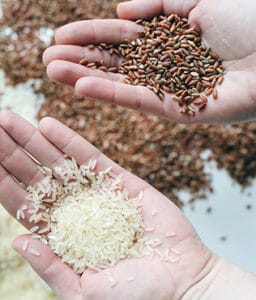Calorie counting and weight loss
If you doubt whether calorie counting is effective, you are not alone.
Dietitians and nutritionists believe that calorie counting is useful because our weight depends on how many calories we take in and use up – calories not used up turn into fat (energy reserves) and increase our weight and our risk of various diseases.
But.
At the same time, there is also the belief that calorie counting is outdated, doesn’t work, and that weight can increase afterwards.
Both sides claim their ideas are science-based, making the situation more confusing.
In this article, we will critically examine the evidence to determine whether calorie counting works.
And let us start with this: what exactly are calories?
What are calories?
Energy is needed to survive – to breathe, to keep your organs working and to maintain your body temperature. You also need it to move and think.
We get this energy from what we eat and drink.
Calories are a unit of measurement used to quantify the amount of energy in food and drink. One calorie is the amount of heat needed to raise the temperature of 1 gram of water by 1°C.
When we talk about “calories” in the context of nutrition, we are usually talking about kilocalories kcal (1 kilocalorie = 1000 calories).
Calorie content in macronutrients:
- 1g of carbohydrate and protein contains about 4 calories.
- 1g of fat contains about 9 calories.
- 1g of alcohol contains about 7 calories.
How are the calories in foods determined?
The calorie content of foods is determined by measuring the heat released or absorbed during a chemical reaction or physical change.
The most common method for food is a device called a bomb calorimeter. This device is essentially a sealed container (ball) surrounded by water.
- A sample of food of a given weight is placed in the bomb calorimeter and completely burned in the presence of excess oxygen.
- The heat generated during the combustion of the food is absorbed by the surrounding water. The temperature rise of the water is measured and used to calculate the amount of heat released during the combustion of the food sample.
- The calorific value is determined by dividing the amount of heat released by the weight of the food sample.
Myths about calorie counting
Calorie counting is, as with all topics related to weight loss, full of myths and half-truths.
Here are some of the most common:
1 All calories are equal
Some people believe calories are all the same, regardless of their source.
This seemingly simple question of whether calories from fat, protein and carbohydrates (or vegetables, fruit and cakes) are the same is controversial because it depends on how you look at it.
On the one hand.
Calories are just a unit of measurement – like centimetres or inches, kilograms or pounds. In other words – 100 calories are and remain 100 calories, regardless of whether they come from an apple, a Coke or a cake.
However.
From a health point of view, all calories are not equal because different foods with the same calorie content can have very different nutritional values and, therefore very different health effects.
For example, 100 calories from vegetables, in addition to energy, provide us with vitamins, antioxidants, minerals, complex carbohydrates and fibre (so necessary for normal intestinal function), while classic cola gives us practically only 100 calories (so-called empty calories).
In other words – it is important to distinguish between quantity and quality and to bear in mind that different foods have different effects not only on our health but also on our metabolism, hormone levels, hunger and appetite and even our mood.
If you look only at energy expenditure, 1 calorie is 1 calorie, and to lose weight you need to consume fewer calories than your body uses.
However, due to health and other factors that affect weight control, such as hormone levels and appetite, not all calories are created equal. For example, eating 2 chocolate sweets (around 140 calories) will not reduce hunger as effectively as eating 3 medium-sized apples (also around 140 calories).
2 The number of calories on the labels is always accurate
Unfortunately, this is not the case. Calorie counts on labels are often approximate. This is especially true for food prepared in restaurants, cafés, and bistros (due to differences in preparation of ingredients and cooking methods).
Calorie counts can also vary within the same raw or industrially produced food. Because:
- Different varieties of fruit, vegetables, etc., may contain different amounts of calories. For example, 100 g of apples do not always contain exactly 52.1 kcal.
- The actual composition of the food may vary. For example, the water content of fruit and vegetables can vary depending on the growing conditions and the stage of ripeness (the more water, the fewer calories per 100 g).
- If a producer uses products from different suppliers for the same product, the calorie content of the final product is likely to vary.
- The number of calories is also determined using indirect methods such as the Atwater system, which determines the number of calories based on the amount of protein, fat, carbohydrate and alcohol in the food. These estimates may not fully reflect the actual calorie content.
- Food labelling rules allow for a certain level of inaccuracy and set rounding rules, which allow manufacturers to round calorie content to the nearest number.
As a result, the calorie counts for the same foods may differ from one source to another. This is one of the main arguments why some people believe that calorie counting does not work – if we do not know exactly how many calories are in each food, we cannot calculate exactly how much and what we should eat.
In my opinion completely illogical argument.
Yes, the calorie count on product labels is not exact, but it does not have to be. These values are necessary to allow us to determine the approximate amount of energy in our food and to be able to manipulate it. For example, to increase or decrease the amount of protein, carbohydrates or fat, or to see if we can still eat a piece of cake today, etc.
An example from another area – my floor scales at home and the scales at the gym show slightly different values. And – does that make weighing less meaningful? Is that why I cannot monitor my weight and adjust my menu if necessary?
3 Not all the food we eat is digested, and no one knows how much is digested and therefore how many calories we get from it
Yes, not everything we eat is digested, and yes – we do not take in all the calories in our food.
But.
We know pretty precisely how many calories we take in.
In 1896, the American scientist Wilbur Olin Atwater carried out a series of experiments to determine the energy value of proteins, carbohydrates and fats. It turned out that proteins release 5.65 kcal/g, fats 9.4 kcal/g and carbohydrates 4.1 kcal/g during oxidation.
Atwater realised that the human body could not digest 100% of food – so he started studying human excrement- and found in them proteins, fats, and carbohydrates.
Further experiments led to Atwater’s general coefficient system, which we still use to calculate the energy available to our bodies from protein (4 kcal/g), fat (9 kcal/g) and carbohydrates (4 kcal/g).
Yes, an atypical gastrointestinal condition can affect the digestion of food and, thus, the energy assimilated.
But.
The particular person had this condition yesterday, has it today and most probably will have it tomorrow. In other words, the deviation in the amount of energy available to the body will remain the same, and – if you will reduce the calorie intake by, say, 15 per cent, you will also take in 15 per cent fewer calories and lose weight.
4 Calorie counting is the only way to lose weight
Weight loss is a complex process influenced by a variety of factors.
And.
While calorie deficit (burning more calories than you take in) is very important, other aspects also play an active role in weight control, such as:
- Nutrient quality. Our bodies need not only energy (calories) but also nutrients. If we do not get the right amount, we can lose weight as well as our health.
- A balanced diet. For the body to function properly, we need to consume nutrients in the right proportions. The proportion of nutrients also affects weight – for example, more protein can keep you fuller for longer (less risk of overeating) and keep your muscles in place when you are slimming.
- Maintaining adequate body fluids is essential for both overall health and during weight loss.
- Regular physical activity burns calories and improves overall health. They can also help maintain muscle mass during calorie deficit.
- Individual metabolic rates vary from person to person. Factors such as age, gender, genetics, and muscle mass influence how many calories our bodies burn at rest.
- Behavioural factors – emotional eating, stress and sleep can affect weight loss. Developing healthy habits and addressing the emotional aspects of eating can significantly improve weight loss outcomes.
5 Skipping meals can help lose weight
Some people believe skipping meals, especially breakfast, can help you lose weight because skipping a meal is like eating less.
In fact, regular, balanced meals help to regulate metabolism and control hunger, and skipping meals can lead to overeating later in the day.
Several studies indicate that skipping meals can slow down the metabolism and lead to weight gain rather than weight loss.
6 Calorie counting is very complicated
Compared to eating what you want, eating when you want and eating as much as you want, calorie counting is restrictive and requires some knowledge about the nutritional value of products and your body’s needs, as well as time, because you have to read product labels and weigh products.
By counting calories, we limit ourselves.
We restrict ourselves to maintain/improve our health, to lose excess weight, to feel better… and – to create the best version of ourselves.
Think of it this way:
- Is driving a car difficult? Compared to walking, yes. But if we want to move faster and become more independent, we learn to drive, learn the rules of the road and take the driving test.
- Is it difficult to learn foreign languages? Compared to your mother tongue, yes. But if we want to talk to people in other countries, read in other languages, etc – we make time and learn.
Similarly, keeping a dietary record is an extra burden, but it helps us to understand what we put in our bodies every day and why, and we can make adjustments if necessary.
To feel better.
To enjoy the image of ourselves in the mirror.
To live a fuller life.
After all, we can either do something to improve our quality of life, or – resign ourselves and whine about slow metabolism, bad genetics, wide bones, the “inevitable” effects of age, etc.
Why may it seem that calories do not affect our weight?
From a biological point of view, weight loss requires a calorie deficit.
However.
There is also the view that what we eat is more important than how much we eat (how many calories we take in) when trying to lose weight.
This is usually supported by studies in which participants on low-carbohydrate diets lost more weight than those on high-carbohydrate diets, even though they consumed as many or more calories.
At first glance, these studies seem to suggest that calorie deficit may not be necessary for weight loss. They are often used as evidence that calorie counting is pointless.
However.
The results of these studies may be influenced by several other factors, such as:
1 People are poor at estimating the amount they eat and their level of physical activity
Many studies rely on participants’ food diaries – self-reported data (rather than direct measurements) – to accurately measure how many calories participants eat or burn during physical activity.
Unfortunately, food and activity diaries are not always accurate – some studies show that calorie intake can be as much as 2000 calories per day higher than reported on the questionnaire.
People also tend to overestimate their physical activity by up to 72%. This is also true when participants are paid for the accuracy of their data.
Even nutritionists often fail to report calorie intake accurately.
2 Low-carbohydrate meals contain more protein and fat
Low-carb diets contain more protein and fat by default, which can help to reduce hunger and cravings and therefore – the total calories consumed during the day.
In addition, digesting protein also requires slightly more energy (compared to carbohydrates and fat), which may contribute slightly to the energy deficit needed for weight loss. However, the fact that slightly more energy is required to digest protein (the thermic effect of food) will not have a significant impact on weight loss.
3 Studies usually measure weight loss, not fat loss
Many studies report only total weight loss, without indicating whether this weight loss is due to fat, muscle, or water loss.
Low-carbohydrate diets are known to reduce carbohydrate stores in the body.
And.
Since carbohydrates bind water, a reduction in carbohydrate stores inevitably leads to water weight loss.
In other words – low-carbohydrate diets help you to lose water rather than effectively lose fat, but from the outside looking in, they may seem to help you lose weight faster than is actually the case.
Research confirms that when you’re in a calorie deficit – weight decreases
To resolve the debate on whether calories are important for weight loss, it is necessary to look only at the evidence from studies that:
- Accurately measured calorie intake and physical activity levels.
- Accurately controlled nutrient intakes (proportion of protein, carbohydrate and fat in the diet).
- Accurately measure changes in water, fat, and muscle mass.
Studies that control these factors consistently show that weight loss always occurs when people take in fewer calories than they burn.
Why is calorie counting so effective?
Calorie counting is a time-tested and highly effective way to lose weight – a huge number of studies show this (see sources at the end of this article).
There are three reasons why calorie counting is so effective:
- Calorie counting can help us determine what eating habits we need to lose weight successfully.
- Although calorie counts are not completely accurate, by tracking what we eat, we have a reference point that helps us adjust our eating habits and reduce the amount of energy (calories) we take in.
- Tracking the food, we eat helps us to monitor our eating behaviours – to be accountable for the choices we make and to motivate us to keep moving towards our goals.
However, it is important to realise that calorie counting is a very effective tool to help us change our eating habits, but weight loss is based on a calorie deficit (we take in less energy than we consume).
How many calories a day do I need to lose weight?
How many calories you should eat per day varies depending on your body shape, height, activity level, health condition and how fast you want to lose weight.
You can calculate your daily calorie needs HERE.
The recommended calorie intake for weight maintenance for adult women is between 1600 calories per day and 2400 calories per day, and for men – from 2000 to 3200 calories per day.
The recommended calorie deficit for gradual weight loss is about 15 per cent less than the recommended calorie intake for weight maintenance and about 30 per cent less for rapid weight loss.
If the calorie deficit is greater than 30 per cent, nutrient deficiency risks increase significantly and can cause unpleasant side effects such as fatigue, increased irritability, poor sleep, etc., at first, but also very real health problems later.
Monitor your progress and adjust your calorie intake if necessary. If weight loss is not happening at the desired rate – you may need to reduce your calorie intake or increase your physical activity.
Key takeaways
Calories are the most powerful tool for weight management. If you take in more calories than your body uses, you are more likely to gain weight, and if you take in less, you are more likely to lose weight.
Some people are able to do this without counting calories.
However.
Calorie counting is an effective way to deliberately create a calorie deficit and maintain it.
Those who want to try calorie counting should remember that all calories are not created equal when it comes to the health effects of diet and also factors such as appetite and hormone levels.
In other words, menus should be based on minimally processed and nutritious foods, not solely on calories.
Eat a balanced diet, exercise and be healthy!
Changes in Diet and Lifestyle and Long-Term Weight Gain in Women and Men
Accuracy of stated energy contents of restaurant foods
CALCULATION OF THE ENERGY CONTENT OF FOODS – ENERGY CONVERSION FACTORS
Quantification of the effect of energy imbalance on bodyweight
Reliability of 24-hour dietary recalls as a measure of diet in African American youth
Why Overweight People Underestimate How Much They Eat?
Brits drastically underestimate calories in snacks
Effects of Low-Carbohydrate and Low-Fat Diets
The effects of a low-carbohydrate diet on appetite
The Effect of Low-Fat and Low-Carbohydrate Diets on Weight Loss and Lipid Levels
Calorie Estimation in Adults Differing in Body Weight Class and Weight Loss Status
Effects of Low-Carbohydrate Diets Versus Low-Fat Diets on Metabolic Risk Factors
The Role of Macronutrient Content in the Diet for Weight Management
Behavioral Modification for the Management of Obesity
The Effect of Adherence to Dietary Tracking on Weight Loss: Using HLM to Model Weight Loss over Time
What Matters in Weight Loss? An In-Depth Analysis of Self-Monitoring
Dietary Self-Monitoring and Long-Term Success with Weight Management
Effect of behavioural techniques and delivery mode on effectiveness of weight management
Associations between self-monitoring and weight change in behavioral weight loss interventions
Self-Monitoring via Digital Health in Weight Loss Interventions

Help to maintain this site, create interesting articles and delicious low-calorie recipes!
Share this article
Follow me on Facebook
I recommend reading these articles as well

Is targeted fat loss possible?
Can fat only be lost from the stomach, hips or thighs? How Fat Loss Works? Which body parts lose fat first?

Nutritional supplements
What exactly are nutritional supplements? Can they help us improve our health and lose weight? Do they help improve athletic performance and relieve joint pain...

The best sources of fiber
Eat more fiber - one of the most common recommendations of nutritionists. But do you know what fiber is and why it is needed?

Menopause and weight gain
What happens to a woman's body during menopause and how these changes affect a woman's weight.

